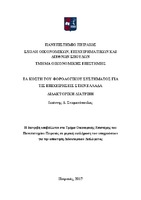Τα κόστη του φορολογικού συστήματος για τις επιχειρήσεις στην Ελλάδα
The cost of corporate taxation in Greece

View/
Keywords
Φορολογικό σύστημα ; Κόστος ; Επιχειρήσεις ; Ελλάδα ; Φορολογικοί συντελεστές ; Χρηματοοικονομική ανάλυσηAbstract
This doctoral dissertation studies the cost of taxation for firms operating in Greece focusing exclusively on the corporate effective tax rates as well as on the corporate income tax compliance costs.
The first part of this dissertation analyzes the determinants of the variability in corporate effective tax rates (ETRs) before and after the beginning of the financial crisis in Greece. Analyzing firm-level data for the period between 2000 - 2014, we find strong evidence that specific firm characteristics including firm size, financial leverage, capital and inventory intensity influence the level of corporate effective tax rates. More specifically, we conclude that larger firms in Greece face higher ETRs, a result that implies that these firms are not capable of exploiting their power to reduce their tax burden, at least not to a considerable degree. The results also indicate that the negative association between ETR and financial leverage that is generally expected can be confirmed only for the under-leveraged firms in Greece, a finding that comes as no surprise taking into account the optimal level of leverage that the firms seek to achieve between the tax benefits of debt and the bankruptcy penalties (trade-off theory). Moreover, the firm’s capital intensity is negatively associated with ETR, confirming the hypothesis that the tax framework is favorable for firms that invest in fixed assets. A negative and significant association also exists between inventory intensity and ETR, a finding that denotes that firms that invest in their inventory face, ceteris paribus, higher ETRs. Furthermore, there exist significant associations between ETR and statutory corporate income tax rates, the reporting of financial losses, the sector in which the firm operates, its location and its legal form. Our results also indicate that corporate effective tax rates and their association with the firm-specific characteristics were significantly influenced in the sub-period after the beginning of the financial crisis. More specifically, we observed that the firms’ ETRs increased in the sub-period after the beginning of the financial crisis (2008 – 2014). Analyzing further this effect, we concluded that larger firms, as well as inventory intensive firms, benefited in the sub-period after the beginning of the financial crisis. On the contrary, firms with higher degrees of investment in fixed assets encountered lower decrease in their ETRs in the same period. The second part of the dissertation examines the corporate income tax compliance costs and their determinants by analyzing survey and financial statements data from firms operating in Greece. It focuses also on the firms’ view of the Greek tax system. More specifically, in this part, we measure the tax compliance costs incurred by firms in Greece to comply with their most important tax obligation, the submission of their income tax return. We find that the public limited liability companies and the limited liability companies in Greece face an average cost of €5,864.46 to comply with the obligation of submitting their income tax return. By generalizing these findings to the population, it was shown that the total income tax compliance costs for those firms can be estimated to €334,837,208.16, an amount that equals to 0.19% of the year’s GDP or 12.61% of the total revenue collected from the corporate income tax. Moreover, we examine the determinants of the corporate income tax compliance costs focusing on the way they vary across firms in the economy. We find that corporate income tax compliance costs vary with several firm-specific characteristics, including the firm’s size, its age, the sector in which it operates, its location and its legal form. More specifically, we conclude that, although income tax compliance costs increase with firm size, they do so less than proportionately. Furthermore, we discover that an increase in firm age results in lower income tax compliance costs, a finding that confirms the ‘learning by doing’ assumption and can be most probably justified on the ground that the firm becomes over the years capable of handling its tax affairs in a more efficient manner. The results also indicate that there are significant associations between income tax compliance costs and other firm characteristics, such as the number of employees, the sector in which the firm operates, its location and its legal form.


